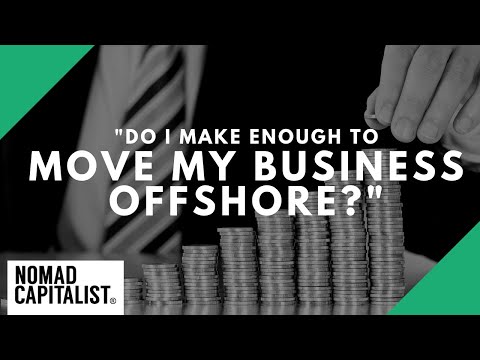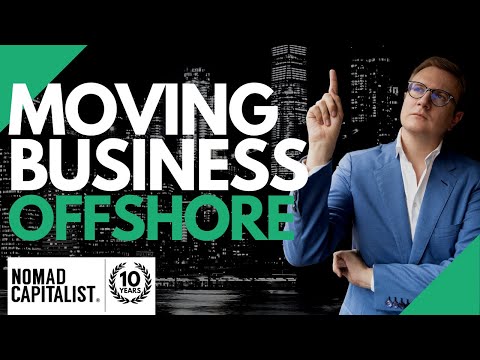How To Know When Your Business Should Move Offshore
October 4, 2023
Last updated October 24, 2020
Dateline: Kotor, Montenegro
Did you know that there are people online who can set up a cheap offshore company for you for “just $672”?
I’m not one of those people.
I won’t give you an empty offshore business shell and a bank account with the minimum deposit and call it a day.
Those are just two tiny pieces of the grand puzzle that is offshore business.
Offshore? Isn’t it all about shady people trying to shuffle money and assets around so that they’re not-discoverable or out of the government’s reach?
Most certainly not. Offshore isn’t this dirty word that you should be afraid to utter when you’re with your family or friends.
I’ve personally spent the last decade writing this blog and using my own name and face in an attempt to drag a once-nebulous industry into the sunlight.
Offshore is primarily about legally saving on tax so that you can reinvest the money in your business instead, as well as reap the rewards of creating a valuable business, employing people, and so on.
I’m not going to beat around the bush. Setting up an offshore company – the right way – will cost you, but in the end, it’ll be much less than you’ll be saving in taxes.
In this article, we’ll explore if and how you could benefit from going offshore and how to know when to take that step.
AN OFFSHORE COMPANY IN A NUTSHELL

In a nutshell, an entrepreneur can move their business offshore simply by setting up a corporation in a different country.
This is called an “offshore company.”
However, that doesn’t necessarily mean that you are literally set up on a tiny island – the traditional, and quite literal, offshore jurisdictions like the British Virgin Islands or the Bahamas.
You can also get the benefits of moving your business offshore by incorporating in an “onshore” jurisdiction like Montenegro or Hong Kong, too.
The favorable tax rates proposed by a foreign country are intended to endorse a healthy investment environment that draws foreign assets.
For a small nation with little capital and a small population, attracting investors and entrepreneurs can increase its economic activity.
Countries like Hong Kong and Singapore started doing this decades ago, realizing that foreign capital was the route to success. Now, they’re up to their eyeballs in money and don’t need any more.
However, countries like Montenegro are still on the way up and open to investors. The flat tax rate here is a mere 9% on both business and personal income.
An offshore corporation works as a shield for the business, protecting it from the higher taxes that businesses pay in their home countries.
These companies pay either very low tax, or zero tax based on the principle of being in a tax haven, a territorial tax country, or simply a low-tax country like Montenegro.
In many cases, you can legally reduce your tax to 0%.
In my case, I was able to reduce my global tax rate from 43% to about 1%. The 1% covers investment profits that I make in low-tax countries where paying some tax is unavoidable.
The rest of my income is global in nature, similar to Amazon sellers, online consultants, eCommerce and drop shipping businesses, or anyone selling products online.
WHO SHOULD MOVE OFFSHORE?
First things first – you have to determine if you have a business at all.
What a silly thing to say, you might be thinking, but hear me out.
You might think you have a business, but if what you do is more of a profession than an entrepreneurial endeavor, then utilizing the Foreign Earned Income Exclusion (FEIE) or becoming a tax non-resident would solve most of your problems.
Not everyone needs a company either.
In some rare cases, an offshore company can actually provide zero benefits for a location-independent entrepreneur or investor.
If your endeavor is a one-man show, consulting, or even a side-hustle, then the question you should ask yourself isn’t “What offshore company should I set up?” but “Do I even need a company to begin with?”.
But if you’ve determined that you do, in fact, have a business, you’re probably curious to find out when going offshore would make sense for you.
IT’S TIME TO MOVE OFFSHORE WHEN…
You feel the pain.
When someone comes to me for help, I ask them the following question:
Is the pain of making the decision to go offshore greater than the pain of actually staying where you are?
If the first is higher than the second, you are not ready.
Paying only $5,000 in tax is not worth flying all over the world to pay administrative fees and fill out lots of paperwork. It is much easier to stay where you are right now. It is simpler to live with the pain.
And by pain, I do not mean physical pain that makes you wail on the floor like the pain of your appendix bursting.
By pain, I mean the amount of money you are paying in taxes, the limitations of not having a second passport, or the feeling of being stuck and not free to do as you please.
What causes you pain is not for me to determine. After all, plenty of people live in California and pay millions each year in taxes, yet are happy to do so to live in Malibu.
But a good way to gauge it is that you might feel that living in a place does not feel right, or that your investments are not in the best location and you are not earning enough money.
Whatever the reason that is causing you to look into the Nomad Capitalist lifestyle and the strategies that I talk about, if that reason is causing you enough pain, then you should think of going offshore.
Let me illustrate with a few examples.
When You Should Move Offshore
I recently spoke with Dean, a business owner in California who paid $378,000 in taxes last year.
I knew that I could help him reduce that to almost zero with the right prescription of corporate structure, bank accounts, and legal residency.
Dean decided to get some help because he realized that every day that went by, he was paying another $1,000 in taxes. He said it was causing him a lot of anxiety because he knew that having that money to re-invest would lead to millions of dollars in extra money for him down the line.
For Dean, the pain of doing NOTHING was worse than the pain of doing SOMETHING.
When You Should NOT Move Offshore
In another story, I talked with a guy named Francois who told me that he was paying about $5,000 in taxes a year.
I figured out pretty quickly that he was someone who was chasing after shiny objects, and that his cry for help was not necessary.
He was chasing after the idea of “I should have a residency,” or “Oh, I should have a company, wouldn’t that be nice?”… rather than “I do not want to pay this much in taxes.”
Paying $5,000 in tax probably isn’t causing enough pain to justify going offshore quite yet. Once you make more money and can afford to do it the right way, then is the time for you.
THE MATH OF GOING OFFSHORE
Another way to think about offshore business is in terms of cold, hard numbers.
Luckily, through many years of doing this, I have found the following to be true (in most instances):
- If you make less than $100,000 a year, there’s probably no point in having an offshore structure.
- When you start making over $100,000 a year, it’s probably time to put some plan in place and make sure you are not going to get nailed on your taxes.
- When you’re making $250,000 and more annually, you should strongly consider an offshore structure.
Another way to look at it is based on your tax bill. If you’re paying at least $50,000 in tax every year, then you would probably benefit from going offshore.
These are the rough guidelines that I advise people to go by because incorporating and running an offshore business also takes money and time.
But each case is unique, of course. You can always get me to look at your case by applying to work with Nomad Capitalist.
Now, remember the people who could set you up with an offshore structure for $672?
Well, the only reason they might be succeeding (for a short while, anyway) is because they haven’t been caught yet.
It’s highly likely, for that price, that they won’t completely check your business out of your home country, or that they will set your offshore company up incorrectly.
The offshore business world is a multifaceted one and requires the utmost care and due diligence.
Needless to say, that will cost you more than six hundred bucks. The actual cost of putting a solid strategy into place and doing it all legally will probably be higher.
I call that the success tax.
For example, if you’re at the quarter-of-a-million-dollars in annual income mark, you really should invest in professional advice that will get you a better standard of service.
Plus, it’s absolutely vital that everything is double and triple checked so that your offshore strategy is bulletproof and fully legal.
What I’m trying to say is, don’t incorporate offshore cheaply and have those bad foundations come back to haunt you.
Believe me, I’ve worked with the folks who did this and I can tell you that it’s much easier (and less legally complicated) just to do things right from the beginning.
WHAT THE MOVE OFFSHORE IS REALLY ALL ABOUT
I’ve spoken about pain and I’ve spoken about the numbers. But really, knowing when you’re ready to go offshore is all about your mindset.
For me, going offshore is about solving problems and satisfying burning desires.
Years ago, I too wasted time debating the finer points of stuff I didn’t need or even want, and it got me nowhere.
I speak from experience when I say that while the idea of getting a second passport may be fun, there has to be some motivating factor to get you to do the work that’s necessary.
I have encountered this with people who mainly focus on whether they should get a company in Cyprus or Hong Kong.
While location does matter, they do not necessarily understand why. It’s just mental fodder.
The most important factor is whether the location where you establish your business can legally save you $100,000, $500,000, or even more in taxes.
Making the decision to actually take action is easier when you pass the ‘shiny objects’ stage and realize that you have a problem and a desire to solve it.
Invest in yourself and commit to fixing it.
Are you willing to change a few things in your life, if it came to that? You could be required to move overseas, to relocate all or some of your employees to another country, and many other things too.
You’re going to be making a few changes, no doubt about that.
But if the ROI is there and you’re willing to go through the changes, that is what going offshore is all about.
OFFSHORING WHEN TIMES ARE TOUGH
Do you think that tough times are the perfect excuse for inaction?
If so, you could be leaving money on the table.
In fact, there are many advantages to moving your business offshore during an economic downturn.
Think about it: when times are good, you’re so overwhelmed by the daily work – doing everything to keep your business running smoothly.
You barely have time to breathe, not even to mention trying to move your business offshore (even though the very thought of bleeding money every day that you’re business isn’t offshore pains you tremendously).
During a downturn, you have more time to look for efficiencies.
There are three good reasons why the answer to the question of “How do I save money as a business?” is to go offshore.
First, with the proper structuring and advice, you’ll be reducing your tax bill.
It’s guaranteed savings; you can legally reduce your tax bill to 0-10% by going offshore.
Second, going overseas will not just reduce your tax but will most likely lower your operating costs, so that you’ll be able to turn a (bigger) profit.
For example, hiring employees overseas usually costs much less. Or, you could consider hiring remote workers all over the world, widening the pool of talent.
Finally, if you want to renounce your US citizenship, going offshore in an economic downturn makes a lot of sense.
That’s because the exit tax is going to be much less. That’s the tax that the government makes you pay when you renounce your citizenship.
We recently helped someone who ran a business that was valued at over half a billion dollars.
As much as he was interested in renouncing, he would have had to pay tax on his share of that business. And he didn’t have that kind of cash because his wealth was all tied up in the company.
But in a downturn, paper valuations of businesses sometimes go down, which makes it the perfect time to renounce as the exit tax will be less (or none at all, if the valuation is below the threshold).
To sum up, low times, while uncomfortable, will allow you to get the maximum value for your offshore dollar.
They’ll allow you to maximize the tax advantages and they’ll set you up for when things bounce back.
SO, SHOULD YOU MOVE OFFSHORE?
For many entrepreneurs, going offshore can be the difference between scaling, profitability, and overall business success versus bankruptcy.
If your business is based in the United States, your higher tax burden may make you less competitive than someone whose company is based in Hong Kong, for example.
But is going offshore right for you? You have to think about your pain-points and whether you stand to gain from it financially.
Every individual’s case is different.
Luckily, I’ve worked with hundreds of clients and have helped many of them take their business offshore and thrive as a result.
Get in touch today and let’s work together on lowering your tax burden – legally.


How to Get UAE Citizenship – The Complete Guide
Sovereignty – both national and personal – shapes ambition, secures wealth, and defines status in a shifting global order. For the high-achieving global citizen, acquiring a second or even third passport is more than a lifestyle upgrade; it’s a strategic move in long-term financial and geopolitical positioning. But not all citizenships are created equal – […]
Read more

A Gateway to Central Asia: New Kazakhstan Golden Visa Program for 2025
Central Asia just raised the stakes in the golden visa game. In May 2025, Kazakhstan officially launched a 10-year Golden Visa program in an ambitious move to position the country as a serious contender in the global investor migration space. At a time when other international regions are rolling back their citizenship and residency options, […]
Read more

Top Countries Offering Golden Visas in 2025
Residency is no longer about lifestyle – it’s about leverage In an increasingly unpredictable world, Golden Visas offer something most governments can’t: certainty in exchange for capital. They are more than migration tools; they are strategic safeguards offering residence rights, future citizenship, global mobility, and access to tax-friendly jurisdictions. For investors, entrepreneurs and globally minded […]
Read more






